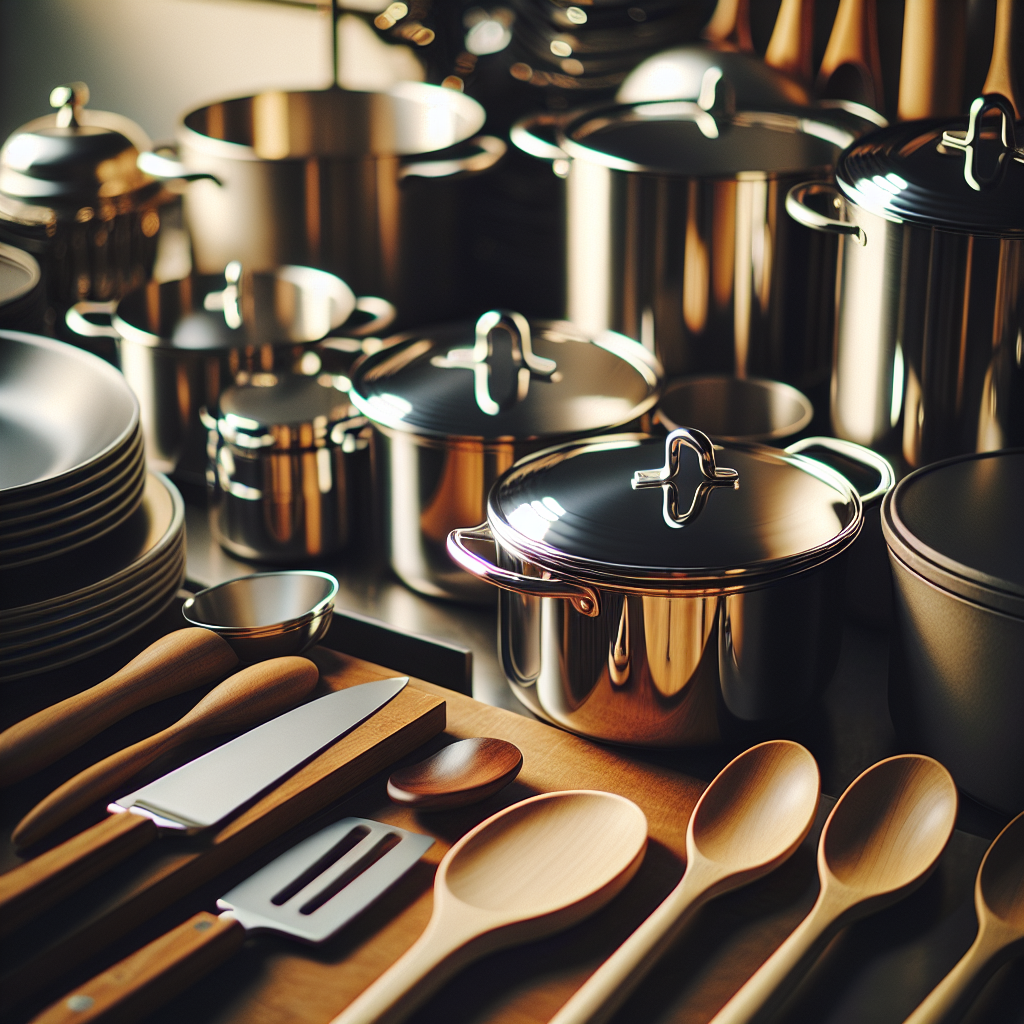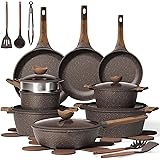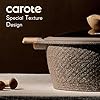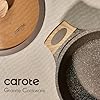Some suggestions to consider!
CAROTE 21Pcs Pots and Pans Set, Nonstick Cookware Sets, White Granite Induction Cookware Non Stick Cooking Set w/Frying Pans & Saucepans(PFOS, PFOA Free)
31% OffCAROTE 26PCS Pots and Pans Set Non Stick, Cookware Set Pots and Pans Induction Cook Ware, Nonstick Kitchen Cooking, PFOA Free
$219.99 (as of February 25, 2026 12:06 GMT +00:00 - More infoProduct prices and availability are accurate as of the date/time indicated and are subject to change. Any price and availability information displayed on [relevant Amazon Site(s), as applicable] at the time of purchase will apply to the purchase of this product.)SENSARTE Nonstick Ceramic Cookware Set 13-Piece, Healthy Pots and Pans Set, Non-toxic Kitchen Cooking Set with Stay-Cool Handles, Silicone Tools and Pot Protectors, PFAS and PFOA Free
$65.94 (as of February 25, 2026 10:30 GMT +00:00 - More infoProduct prices and availability are accurate as of the date/time indicated and are subject to change. Any price and availability information displayed on [relevant Amazon Site(s), as applicable] at the time of purchase will apply to the purchase of this product.)
Choosing the Right Material
Understanding Cookware Materials
One of the first lessons I learned in my cooking journey was that the material of your cookware makes all the difference. You have various options like stainless steel, cast iron, and non-stick. Each type has its own pros and cons that can help or hinder your cooking experience.
For instance, stainless steel is super durable and great for searing. Conversely, non-stick is a lifesaver for beginners, but it can wear out quickly if you’re not careful with utensils.
So, think about what you cook most often. If you’re a health-conscious foodie, you might prefer non-stick for easy cleanup. But, if you enjoy searing meats or making sauces, stainless steel could be your go-to choice.
Heat Conductivity Matters
Another key aspect of cookware material is heat conductivity. Some materials heat evenly, while others can leave you with hot and cold spots. Cast iron, for example, is incredible for heat retention and perfect for slow cooking.
I remember making my first pot roast in a cast iron Dutch oven; the even heat made for the juiciest meat. But if you’re whipping up something quick, like scrambled eggs, you might want to reach for a copper-bottom pan, as it heats up super fast!
Choosing cookware that retains heat properly will elevate your cooking by providing consistent results. Once you get this right, you’ll notice a huge difference in your dishes.
Durability and Maintenance
Lastly, let’s talk about how durable your cookware is and how easy it is to maintain. Some materials require a bit more love and care, like cast iron, which needs seasoning. But hey, the flavor it can add to your dishes is totally worth it!
On the flip side, if you’re more of a low-maintenance cook, I recommend materials that are dishwasher-safe or easy to clean. Stainless steel and certain non-stick options shine in this department.
Remember, investing in the right material from the get-go can save you time and hassle later on, allowing you to focus on what you truly love: cooking!
Investing in Quality Pieces
Why Quality Matters
I can’t stress this enough; investing in quality cookware pays off! Cheap pans may save you a few bucks upfront but can lead to costly mistakes down the line.
From personal experience, I’ve noticed that high-quality cookware performs better and lasts longer, giving you that perfect sear or an even cook that you can appreciate in your meals.
Plus, there’s something satisfying about cooking with beautiful, well-made pots and pans. It’s like having a piece of art in your kitchen that motivates you to cook more!
Recognizing Trustworthy Brands
When I’m shopping for cookware, I always look for trusted brands. They have a reputation for a reason! Researching reviews and asking fellow cooks for recommendations can lead you to great options.
Brands with a solid history of quality also tend to offer warranties or guarantees, which gives you peace of mind. I’ve had a couple of experiences where I sent a pan back for replacement—it really does matter!
Don’t get me wrong, you don’t have to break the bank; there are plenty of affordable yet high-quality options if you do a little digging.
Building Your Collection Over Time
I believe in starting small and building your collection of cookware as you learn what works best for your cooking style. Start with essential pieces and add more as you grow.
For example, I began with a good skillet and a saucepan. Over time, I found myself needing a Dutch oven for stews and a roasting pan for special occasions. You get the picture!
It’s all about discovering your culinary preferences and then adding pieces that will support your kitchen adventures.
Understanding Your Cooking Style
What Do You Love to Cook?
Your cooking style greatly influences the cookware you’ll need. Do you grill often? Then you might benefit from a heavy skillet or a grill pan. If you love baking, invest in some quality bakeware.
Personally, I adore making soups and braises, so a sturdy Dutch oven has become my best friend. Understanding what type of dishes you love to create will guide your cookware choices.
Even if you’re not sure at first, that’s okay! As you experiment, you’ll find what you enjoy and adjust your collection accordingly.
How Often Do You Cook?
Another important question is how often you cook. If you’re someone who whips up meals every day, investing in high-quality, long-lasting cookware is definitely worth your while.
If you only cook occasionally, maybe you can get away with a more budget-friendly line. Look for pieces that combine both quality and function without breaking the bank, so your cooking doesn’t feel compromised.
Trust me, the time you spend in the kitchen will be so much more enjoyable with the right tools at your fingertips.
Experimenting and Expanding Knowledge
Don’t forget that cooking is an art, and experimenting is part of the fun! As you try different recipes and cooking methods, you may find that certain cookware works better with different techniques.
This might mean trying out cast iron skillets for frying or glass baking dishes for casseroles. Every new dish you attempt expands your understanding of what you need in your kitchen.
So, keep exploring and learning. Before long, you’ll have the perfect assortment of cookware catered to your unique cooking style!
Maintaining Your Cookware
Proper Cleaning Techniques
Alright, we’ve all been there—after an epic cooking session, the last thing you want to do is clean. But trust me, how you clean your cookware can extend its lifespan significantly!
For example, never use metal scrubbers on non-stick pans. Instead, opt for a soft sponge and some soapy water. I learned this the hard way….
And don’t forget to read the manufacturer’s cleaning instructions, especially for specialty cookware like cast iron or ceramic. Treat your tools with care and they’ll reward you with years of great cooking.
Storage Tips
How you store your cookware can also affect its condition. If you’ve got limited space, stacking pans can lead to scratches and dents. Investing in pan protectors is an easy solution!
In my kitchen, keeping lids and pots organized has saved so much time and hassle when cooking. This way, I can easily access what I need without digging around.
So, find a system that works for you, whether it’s hanging, stacking, or using shelves. Your cookware will thank you!
Regular Checks and Care
Lastly, take a moment to regularly check your cookware for signs of wear. If you notice a non-stick surface starting to peel or a handle becoming loose, it’s better to address it sooner than later.
For some items, like cast iron, seasoning and maintenance is key to keeping it in prime shape. Once you get into a routine, it becomes second nature.
Remember, your cookware is an investment in your culinary skills; treat it well, and it will serve you for years to come!
Final Thoughts on Cookware Investment
Synthesizing Your Knowledge
Now that we’ve covered the essentials, I hope you’re feeling more empowered to choose the right cookware for your cooking journey. Remember that the right pieces can truly elevate your culinary game.
From materials, investing in quality, understanding your cooking style, and maintaining your gear, each step brings you closer to cooking mastery.
It’s about finding what works for YOU, and that takes a little trial and error, but that’s all part of the fun!
Creating a Cooking Community
Lastly, don’t forget that there’s a whole community out there who share your passion for cooking. Join forums, social media groups, or local classes where you can exchange tips and experiences on cookware.
Learning from others can provide insights you might not have considered. Plus, it’s just plain fun to share recipes and discover new favorites together!
Embracing Your Culinary Journey
At the end of the day, every kitchen tool equals another step toward culinary mastery. So embrace your cooking journey and celebrate the small victories—because that’s what makes it all worthwhile!
Trust me, with the right cookware in hand and a willingness to learn, you’ll be whipping up delicious dishes in no time!
FAQs
1. What type of cookware is best for beginners?
For beginners, non-stick cookware is often the best choice because it’s user-friendly and easy to clean. A basic set that includes a skillet, saucepan, and a pot can cover most cooking needs.
2. How do I properly care for my cast iron skillet?
To care for a cast iron skillet, make sure to season it regularly by applying a thin layer of oil after cleaning. Always avoid soap and don’t soak it in water to prevent rust.
3. Can I use metal utensils on non-stick cookware?
No, it’s best to avoid metal utensils on non-stick cookware as they can scratch the surface. Instead, opt for silicone or wooden utensils to prolong the life of your pans.
4. How do I know when it’s time to replace my cookware?
Look for signs like peeling non-stick surfaces, warping, or a build-up of burnt residue that can’t be cleaned off. If your cookware is affecting your cooking performance, it’s probably time for an upgrade.
5. What are must-have cookware pieces for a versatile kitchen?
A versatile kitchen would benefit from a good non-stick skillet, a heavy-bottomed pan for searing, a pot for boiling, and a Dutch oven for slow cooking. These pieces can handle a wide variety of dishes.













